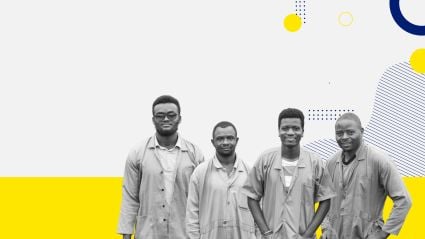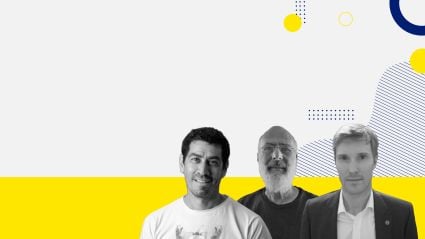
Pictured: Otaigo Elisha, Founder, NovFeed.
Milken Institute: Tell us about your team?
Otaigo Elisha: NovFeed’s implementation team includes four professional members, including one female co-founder. The founding team has a deep knowledge of fermentation, micro- and synthetic biology, biowaste value addition, and fish nutrition. We met at COSTECH 2018's bioscience innovation bootcamp. During the discussion, three of our team members were working on finding alternative protein ingredients for aquaculture and decided to join forces and begin working on a single project: NovFeed.
The team fully understands that in order to supply food and economic growth to support Africa's rising population, farmers will need to boost their productivity. That is why the NovFeed team works to assist fish farms in becoming more productive, resilient, and important contributors to food security.
What inspired you to participate in the Milken-Motsepe Prize in AgriTech? In addition to competing for the $1 million grand prize, what do you hope to gain from this experience?
I believe that by leveraging the collective brainpower of mentor networks (such as the Milken-Motsepe network), we can identify bottlenecks sooner and bypass them in a more cost-effective manner. Ultimately, to achieve our impact goals over the coming years, we will also need catalytic growth capital from AgriTech investors. The Milken-Motsepe Prize in AgriTech can also help us connect with AgriTech-focused funders and investors in the Milken-Motsepe network who would be interested in joining our 2024 Series A funding round.
How will your concept increase economic value to farmers in Africa?
Fish farmers are heavily impacted by the economy and climate change. Due to the high cost of protein-rich fish feed, these farmers are forced to spend 70 percent of their production on pricey feeds like soy and fishmeal. This global problem will hit Africa harder than the developed world.
NovFeed has developed a proprietary chemical-free biotechnological platform where organic waste is converted into a natural, traceable, and safe non-animal and non-GMO protein source to be used in aquaculture. The platform relies on a proprietary fermentation process in which a selected group of bacterial strains produces a nutritious, high-protein feed that has the following features: 1) release of 80 percent less CO2 in the production compared to traditional processes; 2) the final product is free of toxins or feed inhibitors; 3) the process is highly scalable; and 4) the final product is high in protein content, which allows a better nutrition, while being 30 percent cheaper than other protein feed available to farmers. The platform allows for the replacement of production of unsustainable protein ingredients, like fishmeal and soy protein concentrates that are extensively used in aquaculture feeds globally. NovFeed technology holds a wealth of opportunities to be one of the many AgriTech solutions to these challenges of our time.
What sets you apart from other teams in this competition?
My study in Indonesia to a great extent contributed to my passion and desire to pursue an innovative solution to transform the fish farming community. During my time in Indonesia, I had an opportunity to travel to different provinces to see the contribution of the aquaculture sector to Indonesia’s development. My focus was on how aquaculture contributes to poverty alleviation in the poor societies in Indonesia. The lesson I learned from Indonesia opened up my mind to how fish farming has potential to become a key driver for food security and economic development in Tanzania.
That is why I decided to embark on research to find out how Indonesia succeeded in fish farming and why fish feed in Indonesia is more affordable than in Tanzania. By then I convinced my colleague, who was pursuing his master’s degree in China, to conduct similar research in China and in Tanzania. It was from our research that we decided to find alternative fish feed. That is how the idea of NovFeed was born out of Indonesia. NovFeed is now transforming organic waste into protein-rich feed in the emerging and cutting-edge industrial AgriTech to help fish farmers to reduce production cost by 30 percent and produce healthier fish for communities to consume.











